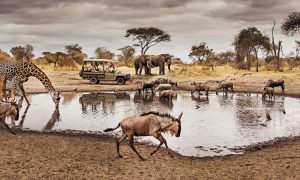Impact of Tourism on Serengeti National Park
The Serengeti National Park in Tanzania is renowned for its breathtaking landscapes, diverse wildlife, and the annual Great Migration of millions of wildebeest, zebras, and other animals. As one of the most famous safari destinations in Africa, the park attracts a large number of tourists each year, eager to witness the wonders of nature up close. However, while tourism can bring economic benefits to the region, it also has a significant impact on the delicate ecosystem of the Serengeti.
Tourism’s Influence on Serengeti Ecosystem
The influx of tourists into the Serengeti National Park has both positive and negative effects on the environment and wildlife. On the one hand, tourism provides vital revenue for the conservation and protection of the park, as well as supporting local communities through employment opportunities and infrastructure development. Additionally, the presence of tourists can raise awareness about the importance of preserving the natural habitats and wildlife of the Serengeti.
However, the high volume of visitors can also put pressure on the ecosystem. Wildlife habitats may be disturbed, leading to changes in animal behavior and migration patterns. Pollution from vehicles and waste disposal can harm the environment, while overdevelopment of tourist facilities can encroach on critical habitats. Furthermore, the introduction of invasive species and diseases by tourists can have devastating consequences for the native flora and fauna of the park.
Sustainable Practices for Park Preservation
To mitigate the negative impact of tourism on the Serengeti National Park, it is essential to promote sustainable practices that prioritize conservation and preservation. One way to achieve this is through responsible tourism management, which includes limiting the number of visitors, enforcing strict guidelines for behavior in the park, and supporting eco-friendly accommodation and transport options.
Another key aspect of sustainable tourism in the Serengeti is promoting wildlife conservation and protection. Tour operators like Sunset Africa Safari play a crucial role in educating tourists about the importance of respecting the environment and wildlife, as well as supporting conservation efforts through partnerships with local organizations. By offering guided tours led by knowledgeable guides and naturalists, Sunset Africa Safari ensures that visitors can enjoy the beauty of the Serengeti while minimizing their impact on the ecosystem.
Additionally, community involvement is essential for the long-term sustainability of tourism in the Serengeti. Supporting local businesses, hiring local guides and staff, and investing in community development projects can help ensure that the benefits of tourism are shared with the people who live in and around the park. By engaging with local communities and empowering them to become stewards of their natural heritage, tourism can foster a sense of ownership and responsibility for the protection of the Serengeti.
In conclusion, while tourism has a significant impact on the Serengeti National Park, it is possible to minimize its negative effects through sustainable practices and responsible management. By working together to preserve this unique ecosystem for future generations, we can ensure that the Serengeti remains a symbol of Africa’s natural beauty and biodiversity for years to come.
For booking requests and more information about guided tours in the Serengeti National Park with Sunset Africa Safari, please contact info@sunsetafricasafari.com.


